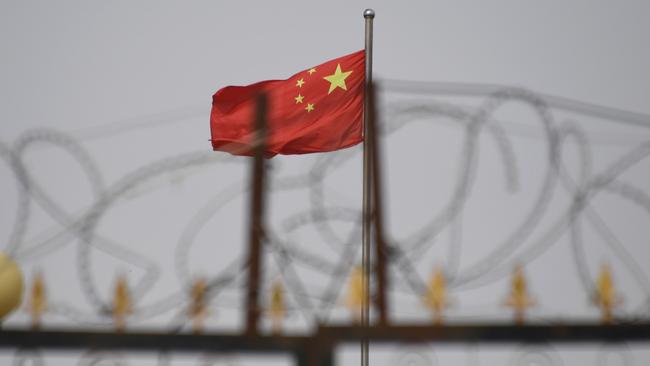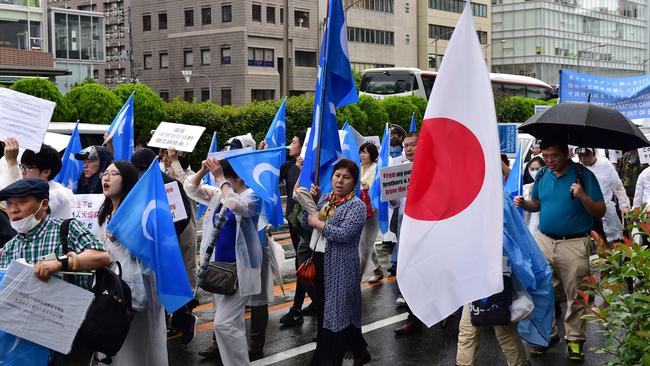Rita Panahi: Time for the world to stand up to China’s sick brutality
The coronavirus pandemic has refocused attention on China and emboldened some nations to take a stand against the superpower but much more needs to be done to address its human rights abuses against the Uighur Muslims and its own people, writes Rita Panahi.

Rita Panahi
Don't miss out on the headlines from Rita Panahi. Followed categories will be added to My News.
China is committing ethnic genocide, torture and enslavement within its borders, and eradicating the rights of millions of Hong Kong nationals under sweeping security laws.
And it is doing so with the tacit approval of much of the world, which either turns a blind eye to its human rights abuses or endorses it through support at the UN. Woke corporations, sporting bodies and the activist class are also strangely silent when it comes to China.
Among China’s most egregious acts of brutality is the treatment of more than a million Uighurs languishing in concentration camps for no reason other than their Muslim religion. Those who have escaped these horror “re-education” facilities have detailed accounts of sickening psychological and physical torture.
Sayragul Sauytbay, who was held in 2017, described seeing women being repeatedly raped. “The policemen ordered her (the detainee) to disrobe and simply raped her one after the other, in front of everyone,” she said.
“They checked to see how we were reacting. People who turned their head or closed their eyes, and those who looked angry or shocked, were taken away and we never saw them again.

I will never forget the feeling of helplessness, of not being able to help her.”
The depths of depravity of the Chinese Communist Party don’t end there. Detainees in Chinese prison camps, including Falun Gong practitioners, are also being killed for their organs, according to the China Tribunal — an independent investigative body chaired by Sir Geoffrey Nice QC.
“Forced organ harvesting has been committed for years throughout China on a significant scale,” the tribunal’s report concluded last year. “From 2000, there was an explosion of organ transplant activity in China, with unusually short waiting times. Chinese websites advertised hearts, lungs and kidneys for sale for advance bookings, indicating that victims were killed on demand.”
The transplant trade is estimated to be worth more than $1bn annually for China; a healthy liver fetches about $160,000.
It’s not just the Muslim population who are persecuted. Any religious observance is seen as a threat against the Chinese Communist Party, which oppresses more than a billion people who risk prison, torture and even death if they dissent. China’s regime is so intolerant of criticism even the mildest mockery can see an individual arrested.
In the Xinjiang region, the Chinese government has forced hundreds of thousands of minority women, predominantly Uighurs, to have pregnancy checks, abortions and sterilisation, according to an Associated Press investigation released last month.
The report found: “The result of the birth control campaign is a climate of terror around having children … Birthrates in the mostly Uighur regions of Hotan and Kashgar plunged by more than 60 per cent from 2015 to 2018.”
These findings are backed by research by the Jamestown Foundation led by leading China scholar, Adrian Zenz, which shows that while sterilisation rates plunged in the rest of China, they increased by 700 per cent in Xinjiang from 2016-18. The US has called on China to end the practices but the Muslim world is silent about the mistreatment of fellow Muslims.
How can a “blasphemous” cartoon in the Netherlands lead to riots and formal condemnation from leaders of multiple Muslim-majority countries, but the systematic and brutal subjugation of millions of Uighur Muslims barely rates a mention?

China’s economic might and its willingness to punish countries critical of its regime has seen the Muslim world back the dictatorship and ignore the plight of Uighurs in concentration camps.
At the UN Human Rights Council this month, 53 nations backed China’s crackdown on Hong Kong, while 27 voted against. Beijing celebrated its UN triumph as international validation of new national security laws that criminalise anti-CCP dissent in Hong Kong and are considered by many the end of the “one country, two systems” model.
Australia joined much of the free world in voting against the laws but Iran, Saudi Arabia, Kuwait, Iraq, Sudan and a host of other Muslim-majority countries stood with China. All but five of the 53 nations that backed China are signed up to its controversial Belt and Road Initiative.
Victoria is the only state or territory in Australia that has signed up to the program, designed to expand China’s political and economic influence. The initiative is already compromising the sovereignty of nations; it’s no coincidence that the only free countries that supported Beijing at the UN — all three of them — are signatories to the BRI.
The coronavirus pandemic has refocused attention on China and emboldened a number of nations to take a stand against the superpower but more needs to be done.
IN SHORT
Restaurants and bars are full across the country but in locked-down Melbourne a trip to the local cafe for a takeaway latte is about as good as it gets. But will that booming trade be impacted by compulsory mask wearing?
Rita Panahi is a Herald Sun columnist

